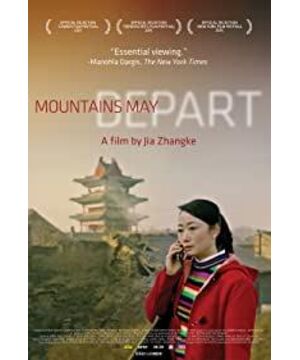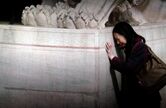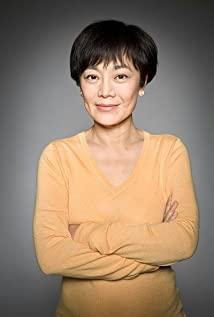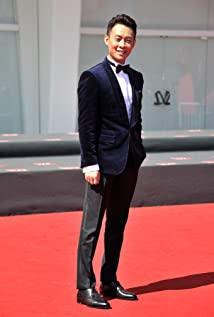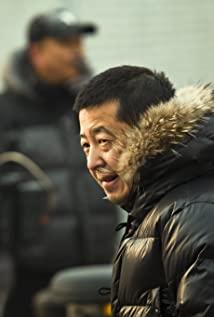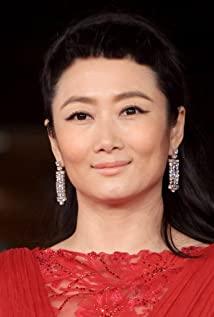It was snowy outside, snowflakes were flying, and her silver hair was looking for a step, dancing awkwardly, and the familiar song "Go West" rang in her ears.
Under the panoramic view, the Wenfeng Pagoda and antique buildings in the distance are still standing in the background, people are dancing in the painting, and the words are desolate.
I'm always thinking about what the image is going through to make people cry. Just like at the end of "Departed from the Mountains and Rivers", when the music is played, the moment the camera cuts from the background to the panorama, tears will flow unconsciously.
The tears of some movies are traces of human design, such as the sentence in the movie "Everyone can only accompany you for a while, and sooner or later must be separated". I think the design of this sentence, for the film expression, is a flaw, but it has a considerable audience. It's like the sentence "If you like it, you must be presumptuous, but if you love it, you must be restrained." These should have been written by film critics or audiences after watching. A wounded young man can shove these words into his mouth like chicken paws, and still feel the aftertaste after smacking them for days.
But these are not my points, I like the emotional accumulation that is just right, I hope the way I shed tears is through some interaction with the creator, rather than being led into a designed, simple Rough tears.
Another kind of teardrop is inherently risky to create, because it requires the director to have enough confidence in the film itself to keep the audience's attention for a long time. For example, the last stroke of "Old Man in Mountains and Rivers": the audience who missed the opening dance will not understand; the audience who ignores any panoramic shot of the background of Wenfeng Pagoda because of distraction is also emotionally incapable of stacking. This kind of tears is not like the golden sentence of chicken soup. When it is singled out, the audience can also shed tears in the brain through their own experience; but it requires the audience to maintain the emotion with the creator during the viewing process from beginning to end. Interactive and slow climax. The process itself is actually very interesting. Treating the movie as a mountaineering trip, only when you reach the end can you understand the meaning of every step you take, and you will suddenly become enlightened in the emotional outburst.
The last time Jia Zhangke's feature film entered theaters was nine years ago. I still remember that when he arbitrarily put "The Three Gorges" and "The Golden Armor of the City" on one day, he said something like "I just want to know that in this era when everyone likes gold, Does anyone care about good people?" These words were a bit sour back then, but they were more respectable than Wang Xiaoshuai's attitude of crying around like a Xianglin's wife because of the lack of "Intruder", not to mention that it was 9 years ago.
Later, when I was in my freshman year, I forgot what kind of opportunity (probably to pretend to be forced). I have watched a lot of his movies, from "Hometown Trilogy" to "The Three Gorges" and "The Twenty-Four Cities", I really like them, and Fenyang has also become a place that, in my opinion, is the same as Shandong Gaomi and Henan. A place full of stories like Yeonjin. I remember the final thesis for a freshman class, and what I wrote was a discussion of the special effects elements in "The Good Man of the Three Gorges". Those rough but approachable shots in the "Hometown Trilogy" were really obsessive back then. Those films gave me a window into a small county in China, and from there I saw life experiences that were completely beyond my life experience. It is also another reason why foreigners are interested in Jia Zhangke's films, that kind of presentation of the simplicity of China.
Years later, when I saw "The Destined", I felt that Jia Zhangke had taken a strange and deformed path. Although the violent aesthetics in "Doomsday" can surpass all domestic films, you can also see Jia's potential as a genre director from this film. But the ubiquitous hostility in that work made me feel that the director was evolving into an angry youth who was detached from himself and his unique expression. In that work, it felt like it was completely opening its arms and kissing the output of Western values, showing a turbulent and useless eastern continent to the fullest.
Facts have proved that "Tian Destined" is just an episode, maybe it is also a kind of vent, after venting, continue to return to the path of the self.
"Old Man of Mountains and Rivers" made me feel the vitality of the sixth generation of "Dumiao". Whether it is Lou Ye's "Tuina" or Wang Xiaoshuai's "Intruder", although both have their own influence, they are slightly narrower than Jia in terms of vision. Ning Hao can continue to explore in genre films, Wang Anan and Zhang Yuan continue to be busy breaking the law and discipline, and Guan Hu, who has fewer films, can look forward to "Old Pao'er" at the end of the year, Lu Chuan? Don't hesitate to tell him. When the older generation of filmmakers are already immersed in the ocean of commercial films and they are embarrassed and unable to extricate themselves, when non-professional directors hold IP and make money, Jia's ideas and vision are nothing more than forward-looking, and his expression seems to be better than in his films. The characters of 2025 are one step faster.
Zhao Tao's last dance in "Old Man in Mountains and Rivers" is more powerful than Liao Fan in "Fireworks in the Daytime", and more sentimental than his dance in front of the Three Gorges Dam ten years ago. And Jia Zhangke is also slowly returning to the track he is familiar with and good at doing bigger things.
Spring comes and spring goes again, as if old friends are coming.
View more about Mountains May Depart reviews


